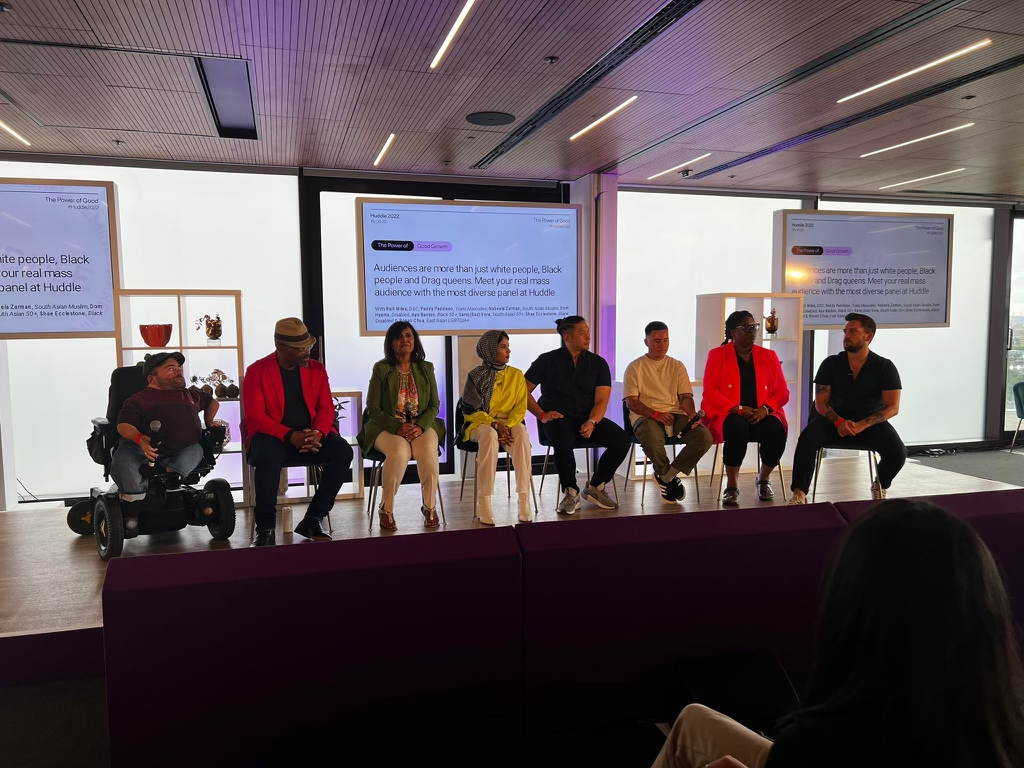10th November 2022
Huddle 2022: what Kevin Bacon can teach media planners about the value of diversity
Diversity Standards Collective at Huddle 2022
Brands and media agencies are missing out on lucrative audiences by failing to consider the complexity and intersectionality of diversity in modern Britain.
That was the main message from our Mindshare Huddle panel session “Audiences are more than just white people, black people, and drag queens” organised by the Diversity Standards Collective (DSC).
The DSC is a cultural consultancy connecting brands and agencies with diverse people. Promising the most diverse panel Huddle has ever seen, the session heard from a range of experts from under-represented audiences.

The consensus was that brands can be guilty of assuming the overwhelming majority of their audiences are white, straight, and non-disabled. Even when under-represented groups do appear in campaigns many on the panel thought that advertisers can be guilty of choosing “trendy” minority groups and / or attempting to piggyback on social movements such as Black Lives Matter. Others on the panel felt that brands can be guilty of stereotyping – with South Asian women often portrayed as “meek and mild”, or Muslim women presented as being “liberated” by removing their hijabs. Wheelchair users are often used as a kind of shorthand for representing disabled people on screen, when in reality only 8% of disabled people use a wheelchair.
One major talking point was that brands fail to understand or represent how diverse audiences blur and intersect. Perhaps because of the way the ad industry categorises audiences by gender, ethnicity, age, or sexuality, certain groups – for example people who are black and disabled, or South Asian women over the age of 55 seldom appear in adverts.
The panel was clear that better-representing minority groups doesn’t have to come at the cost of representation of white, straight people. In fact, brands are at risk of alienating white, straight audiences by failing to accurately represent the modern Britain they live in.
This is because advertisers sometimes neglect to understand the networks that individuals have around us. Even if your audience is predominantly white, the chances are they will have friends, partners, family, or colleagues who come from a minority group. The panel likened this concept to the game “Six Degrees of Kevin Bacon” where virtually every film ever made ultimately links back to a film that features the actor.
Ultimately, the panel emphatically made the point that representation is not just the right thing to do – it makes commercial sense. Added together, minority audiences account for one third of the total UK population while over 55s are under-represented in mainstream advertising yet tend to be more affluent than younger demographics. As one panellist put it – “disabled people make up 15-20% of the UK population. It’s not just doing the right thing to represent them – you’re mad if you don’t!”.
The session encapsulated our Good Growth ethos. The message from the panel couldn’t have been clearer. Brands are leaving money on the table by failing to represent diverse audiences in all their complex forms. It’s a big challenge but as one panellist summarised – if you are going to reach underserved audiences, make sure you have someone in the room who has the lived experience necessary to properly understand them.
To find out more about the DSC, visit here and to watch this session in full, you can do so here.